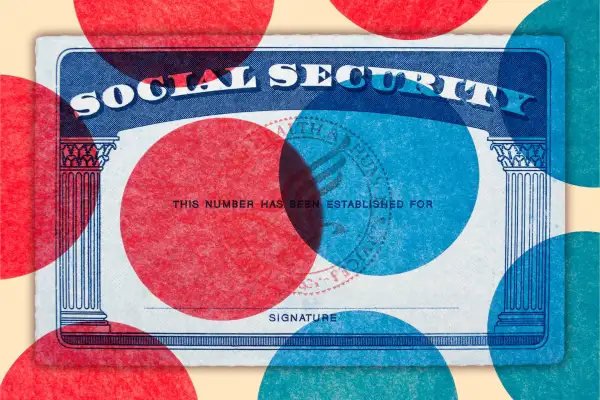Where Do Donald Trump and Kamala Harris Stand on Social Security and Medicare?

Americans are worried about Social Security and Medicare. A recent survey reveals that nearly three-fourths of adults have serious concerns that Social Security will run out of funds during their lifetime. Almost one-fourth say they don’t expect to receive anything from the fund, which has traditionally been a critical component of a healthy retirement strategy.
Worries about Medicare are worse. A 2024 Gallup poll reveals that a similar number of people — 73 percent — are concerned Medicare benefits will not be available when they reach eligibility.
Considering those concerns, it is not surprising that the future of these programs is a key issue in the upcoming presidential election. Here are some of the ways candidates say they will address the concerns.
Trump says he will stimulate economic growth to help fund Social Security and Medicare
Former President Donald Trump has expressed a commitment to keeping Social Security and Medicare benefits from being cut despite projections of shortfalls. His campaign’s website says he will “fight for and protect Social Security and Medicare with no cuts, including no changes to the retirement age.”
Trump’s plan for keeping Social Security and Medicare healthy is primarily focused on strengthening the economy. The idea behind the approach is that economic growth increases wages, leading to higher tax revenue for Social Security. The 2024 GOP Platform explains that a Trump victory would give Republicans the opportunity to “tackle inflation, unleash American Energy, restore Economic Growth, and secure our Borders to preserve Social Security and Medicare funding for the next Generation and beyond.”
Trump says he will not raise tax rates to increase funding for the programs. In fact, he recently vowed to eliminate taxes on Social Security, saying seniors “should not pay taxes on Social Security and they won’t.” Trump has also spoken against raising the eligibility age for benefits, which has been suggested as a solution for continuing programs without reducing benefits.
Regarding Medicare, a Trump presidency could result in increased privatization to ensure benefits are available. During his term in office, Trump signed an executive order seeking to preserve a Medicare environment in which Americans could choose to use Medicare funding on private health insurance, and it is expected that Trump would continue to support that policy during a second term.
Trump’s first presidency also provides some insights on how he might address prescription drug costs, which can significantly impact those relying on Medicare. Trump signed four executive orders seeking to lower drug prices, although some of their provisions were later rescinded.
Kamala Harris could expand benefits and increase taxes on high earners
Vice President Kamala Harris, the Democratic Party’s nominee, has indicated that her approach to addressing issues with entitlement programs will align with what the Biden administration has already proposed. One of the administration’s key positions has been a commitment to avoid benefit cuts. President Biden announced in March, as part of his budget fact sheet, that he “opposes any proposal to cut benefits.”
Harris’s political background on Social Security suggests she may push for increased benefits. While serving as U.S. senator in 2019, Harris co-sponsored a Social Security reform bill – the Social Security Expansion Act – that would have increased minimum benefits and changed the plan’s cost-of-living adjustment calculation method to better reflect modern economic demands.
Harris’s plan would likely involve raising taxes to address the projected shortfalls of entitlement programs. The Biden administration budget sought to call upon “the highest-income Americans” to help protect Social Security by paying “their fair share” in taxes. The budget also proposed “modestly increasing the Medicare tax rate on incomes above $400,000.”
If Harris’s support of the Social Security Expansion Act is an indicator, a Harris presidency might also bring more aggressive payroll tax collection. The current framework caps the taxable amount at approximately $160,000 per year, but the Social Security Expansion Act seeks to increase the cap to $250,000.
A continuation of the Biden administration’s approach to prescription benefits would have Harris looking to lower out-of-pocket costs as provided for in the Inflation Reduction Act. The law gives Medicare the power to negotiate lower prices for high-cost drugs, with the goal of passing the savings on to seniors.
How to plan for Social Security and Medicare changes
Regardless of the election outcome, Americans should remember that Congress — not the President — holds the power to change the laws governing entitlement programs. Presidents can influence the development of those laws, which they do primarily through their budgets, but they rely on support from Congress to bring about long-term change. For Harris, that would mean gaining bipartisan support in a Republican-controlled House of Representatives.
For those wondering how they can plan for the future, there are some outcomes that are safe to assume regardless of who wins the election. First, benefits will not change for anyone already receiving benefits, which means seniors can plan on continuing to receive their current amount. Second, unless a solid alternative appears — and it hasn’t yet – Social Security taxation will probably eventually be increased for higher income earners. Third, even with a tax increase, it is my opinion that the retirement age will definitely be pushed back at some point in the future.
Overall, no one should count on Social Security to provide 100 percent of their retirement income. Regardless of the changes that could take shape after the election, Social Security benefits should not be counted on to provide more than 50 percent of your retirement funding.
More from Money:
5 Proposals to 'Fix' Social Security — and How They Could Affect Your Benefits
Medicare Drug Negotiations Expected to Save Enrollees $1.5 Billion a Year
This Stock Market Stat Has Predicted 83% of Presidential Elections in the Past Century
